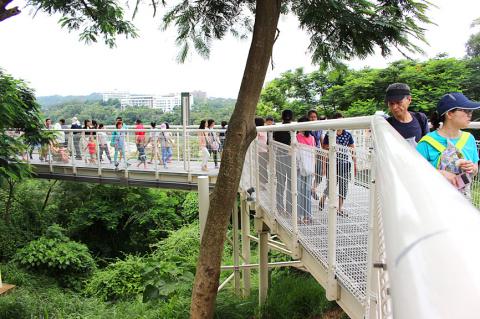A new skywalk opened on Changhua County’s Baguashan (八卦山) yesterday, with thousands of visitors lining up to inaugurate the longest skywalk in central Taiwan.
The 1,006m Baguashan Skywalk, which cost more than NT$80 million (US$2.48 million) and took 22 months to build, starts from a 26m-tall Buddha statue and passes over an ecological park, a baseball stadium and a local high school before ending at the National Changhua Living Art Center.
The county government constructed the skywalk to draw attention to the landscape of Baguashan, which is often described as the county’s top destination.

Photo: Chang Tsung-chiu, Taipei Times
The bridge has a deck height of between 1m and 16m.
On some parts of the bridge there are stairs connecting to trees so that visitors can climb into the treetops.
There are no admission charges during the initial opening period, but during that time only four of the seven entrances to the bridge are open, as three entrances from the Changhua Arts Senior High School are closed for safety reasons.
Locals said the bridge has revived tourism on Baguashan, which had more visitors yesterday than it had on any day during the Lunar New Year holiday period.
However, a visitor surnamed Tsai (蔡) from Taichung’s Wuchi District (梧棲) said the bridge’s management should have put more personnel in charge of visitor safety.
A visitor surnamed Chen (陳), who has visited a skybridge in Chiayi County’s Jhuci Township (竹崎), said the Baguashan skywalk was better, but the bridge was shaky in steep sections — possibly because there were too many visitors.
“The number of visitors must be carefully managed, and safety measures must be in place to control visitor flow,” Chen said.
“Whether the bridge is worth NT$80 million can only be judged with time. The bridge can sustain tourism development if it brings in enough tourists over an extended period. The county government can build more tourism facilities along the skywalk, such as turning old buildings under the bridge into cafes or restaurants,” said a visitor surnamed Yang (陽) from Taichung’s Shalu District (沙鹿), who works in architecture.
Changhua County Commissioner Wei Ming-ku (魏明谷) said Baguashan is the county’s “sacred mountain,” and its ecological resources and relatively even terrain make the mountain an attraction for visitors both young and old.
While the bridge is designed to take 10,000 visitors, only 2,000 visitors are allowed to be on the bridge at any one time to avoid congestion and consequent discomfort, Changhua Department of City and Tourism Director Tien Fei-peng (田飛鵬) said.
Warning signs have been erected at some sections of the bridge to prevent visitors from lingering to avoid congestion, Tien said, adding that the bridge is designed to resist earthquakes, gusts of wind and torrential rain.

US climber Alex Honnold is to attempt to scale Taipei 101 without a rope and harness in a live Netflix special on Jan. 24, the streaming platform announced on Wednesday. Accounting for the time difference, the two-hour broadcast of Honnold’s climb, called Skyscraper Live, is to air on Jan. 23 in the US, Netflix said in a statement. Honnold, 40, was the first person ever to free solo climb the 900m El Capitan rock formation in Yosemite National Park — a feat that was recorded and later made into the 2018 documentary film Free Solo. Netflix previewed Skyscraper Live in October, after videos

Starting on Jan. 1, YouBike riders must have insurance to use the service, and a six-month trial of NT$5 coupons under certain conditions would be implemented to balance bike shortages, a joint statement from transportation departments across Taipei, New Taipei City and Taoyuan announced yesterday. The rental bike system operator said that coupons would be offered to riders to rent bikes from full stations, for riders who take out an electric-assisted bike from a full station, and for riders who return a bike to an empty station. All riders with YouBike accounts are automatically eligible for the program, and each membership account

NUMBERS IMBALANCE: More than 4 million Taiwanese have visited China this year, while only about half a million Chinese have visited here Beijing has yet to respond to Taiwan’s requests for negotiation over matters related to the recovery of cross-strait tourism, the Tourism Administration said yesterday. Taiwan’s tourism authority issued the statement after Chinese-language daily the China Times reported yesterday that the government’s policy of banning group tours to China does not stop Taiwanese from visiting the country. As of October, more than 4.2 million had traveled to China this year, exceeding last year. Beijing estimated the number of Taiwanese tourists in China could reach 4.5 million this year. By contrast, only 500,000 Chinese tourists are expected in Taiwan, the report said. The report

Temperatures are forecast to drop steadily as a continental cold air mass moves across Taiwan, with some areas also likely to see heavy rainfall, the Central Weather Administration (CWA) said. From today through early tomorrow, a cold air mass would keep temperatures low across central and northern Taiwan, and the eastern half of Taiwan proper, with isolated brief showers forecast along Keelung’s north coast, Taipei and New Taipei City’s mountainous areas and eastern Taiwan, it said. Lows of 11°C to 15°C are forecast in central and northern Taiwan, Yilan County, and the outlying Kinmen and Lienchiang (Matsu) counties, and 14°C to 17°C